Dawn Westlake – Making Independent Filmmaking Look Easy
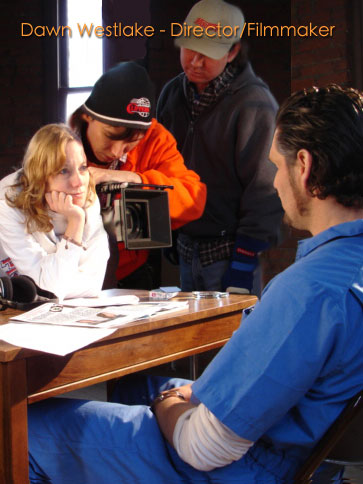 Dawn Westlake is a graduate from Northwestern University’s Radio-TV-Film program. She has been acting, writing, directing, and producing media and theater in Chicago, San Francisco, Los Angeles, Upstate NY, and Northern Portugal. She won the Mark of Excellence Award from the Society of Professional Journalists for a televised interview with former President Jimmy Carter in 1987 and NU’s prestigious Richter Scholarship for a thesis on TV3, Televisió de Catalunya in 1984. She was named a Platinum Filmmaker by Canon USA in 2002 and won an award for personal expression from JVC-Tokyo in 2005. Collectively, Dawn’s seven short films produced under her Ron de Caña Prods., Inc., banner have played on all seven continents and have won 38 international awards. She was named one of the “Top 100” short filmmakers in the world by Cultural Mall in 2008. And if that weren’t enough, Dawn is also fluent in Spanish and proficient in Portuguese and Italian.
Dawn Westlake is a graduate from Northwestern University’s Radio-TV-Film program. She has been acting, writing, directing, and producing media and theater in Chicago, San Francisco, Los Angeles, Upstate NY, and Northern Portugal. She won the Mark of Excellence Award from the Society of Professional Journalists for a televised interview with former President Jimmy Carter in 1987 and NU’s prestigious Richter Scholarship for a thesis on TV3, Televisió de Catalunya in 1984. She was named a Platinum Filmmaker by Canon USA in 2002 and won an award for personal expression from JVC-Tokyo in 2005. Collectively, Dawn’s seven short films produced under her Ron de Caña Prods., Inc., banner have played on all seven continents and have won 38 international awards. She was named one of the “Top 100” short filmmakers in the world by Cultural Mall in 2008. And if that weren’t enough, Dawn is also fluent in Spanish and proficient in Portuguese and Italian.
How did you get started in filmmaking?
As an actress I’ve been in SAG and AFTRA for about 20 years now and I basically got really frustrated from having no control. People treating you like, don’t let the door hit you in the bottom on the way out. That got old. So I started writing stuff and I thought a producer would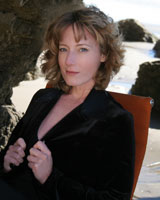 come along, and of course they never did. So then I started producing for myself. After a while, directing. I did my first film (Mini Driver Project) in Portugal.
come along, and of course they never did. So then I started producing for myself. After a while, directing. I did my first film (Mini Driver Project) in Portugal.
How is it that you were able to do your first film in Portugal?
I was trying to co-produce a feature film with Spain or some other Mediterranean country. I bought the rights to a very famous Spanish novel, and I was trying to get that done. I was knocking on doors and then knocking my head against the wall. And it wasn’t working out. So a friend of mine told me I needed to have a script and a tape of something I already produced, perhaps here in Portugal, and show that you can command a foreign crew. It didn’t make my co-production dreams come true.
How long does it take for you to write a screenplay?
I’m always writing in my head, so you could say it takes months and years, or if you want to talk about the time that I sit down, not that long—just a couple of days. When I feel like I’m 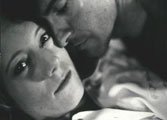 ready to shoot, I go to my crew, the Moser brothers. They do a lot of visual effects work, animation for really big shows and studios. When they have free time, that’s when we do my low budget stuff. They always tell me this is the stuff that has meaning. So they like being involved.
ready to shoot, I go to my crew, the Moser brothers. They do a lot of visual effects work, animation for really big shows and studios. When they have free time, that’s when we do my low budget stuff. They always tell me this is the stuff that has meaning. So they like being involved.
Are all of your films shorts?
Yes, they’re all shorts. The shortest one is eight minutes. That’s “The Life of Death” and the longest one is “God’s Good Pleasure.” That’s about 18-1⁄2 minutes.
What has been one of your biggest challenges when shooting your films?
Portugal was challenge because I was so far away from home in a different culture, but I’ve really been fortunate. I haven’t really had any big obstacles. I always work with people that I know I can trust. Also I rarely have ever cast. And what I mean by that is, I write for people I already know. In fact the first time I ever cast is for the most recent film. I cast “The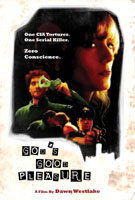 Grandpa.” I didn’t know anybody of that race in that age group. I couldn’t believe I didn’t know any 60 plus black actors. I put out an ad, and I found this wonderful gentleman, Warren Watkins, took him to lunch, and I didn’t even have him read lines. He was the part.
Grandpa.” I didn’t know anybody of that race in that age group. I couldn’t believe I didn’t know any 60 plus black actors. I put out an ad, and I found this wonderful gentleman, Warren Watkins, took him to lunch, and I didn’t even have him read lines. He was the part.
You seem to have an instinct.
I think I do have an instinct. Creepy sometimes. When I don’t follow my gut, that’s when I usually have problems.
You’re also an actress. Do you act in all of your movies?
Not all of them, but most of them.
What’s your background?
I was always acting as a kid. Then I thought that was not a very serious pursuit, so I went to Northwestern to be a broadcast journalist. And when I got out of school they were laying people off. It was the time of Laurence Tisch at CBS and the big strike at NBC, and there were no jobs. I hit rock bottom and I had always been this overachiever and here I was applying myself, pounding the pavement. People didn’t even want me to script bust or get 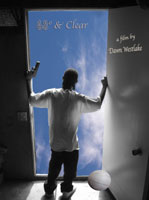 coffee. My then boyfriend, now husband was in my room at my parents’ house and saw all my trophies. He said, “I didn’t know you were an athlete.” I told him the trophies were for acting. He then said, “Why don’t you do that?” I told him it wasn’t a serious career, but he said a lot of people take it really seriously and they do well. So I went back to school and started studying at Second City in Chicago. I did some international commercials and industrials, then moved to San Francisco, did more work, and then came here.
coffee. My then boyfriend, now husband was in my room at my parents’ house and saw all my trophies. He said, “I didn’t know you were an athlete.” I told him the trophies were for acting. He then said, “Why don’t you do that?” I told him it wasn’t a serious career, but he said a lot of people take it really seriously and they do well. So I went back to school and started studying at Second City in Chicago. I did some international commercials and industrials, then moved to San Francisco, did more work, and then came here.
Was it hard finding an agent?
In Chicago not so much, because you can be multi-listed. You could have as many as 12 agents. So it can be exhausting making the rounds. You have a lot of people looking out for you. San Francisco I signed right away. Here . . . yeah, it was very difficult. I also ran into people whose ethics weren’t square with mine. That’s another reason I catapulted into setting my own schedule and taking charge.
As an actress, do you find it helps you with your directing skills?
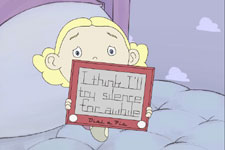 Oh, definitely. You try to put yourself in their position and try to encourage them to use things from life. Or if you see in their eyes that that might be too painful, you tell them about something in your own life.
Oh, definitely. You try to put yourself in their position and try to encourage them to use things from life. Or if you see in their eyes that that might be too painful, you tell them about something in your own life.
I like the fact that you don’t cast. I think you’re getting more authentic performances.
Absolutely! My father wrote and narrated the piece “The Life of Death.” And he’s probably one of my favorite actors. And he’s actually a material scientist. No acting bug ever hit him.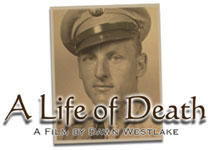 My editors said it was the easiest edit ever. He made his choices and he hit his mark the same every time. It was great working with my dad.
My editors said it was the easiest edit ever. He made his choices and he hit his mark the same every time. It was great working with my dad.
Highest High:
When I finish something and have it in the box with the packaging. That’s the greatest feeling. As far as festivals or awards . . . one thing that was pretty glamorous, I was invited to Taipei in 2004. I was up for what the Taiwanese consider their Oscar, called “Golden Horse.” I was flown there and put up in the Hyatt. One of the guys I competed with ended up winning our Oscar for Best Animated Short. A guy named Steven Hoban, the maker of “Ryan.” [I felt like I arrived.] But I love every festival I’m in. I’m starting to judge festivals now.
What medium do you shoot on, film or digital?
I call myself a filmmaker, but we always shoot mini DV. I’ve used the Canon XL, the Sony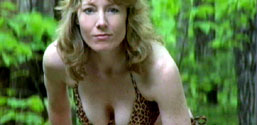 PD150, and the Panasonic DVX 100A. I used to edit on Premiere, but now I edit on Final Cut Pro.
PD150, and the Panasonic DVX 100A. I used to edit on Premiere, but now I edit on Final Cut Pro.
Do you edit your own films?
I’ve not edited my own movies, but I have this hobby doing all these viral vids for revver.com and YouTube.com and those I edit myself.
Lowest Low:
The first film in Portugal. There was this scene that was a health club which we turned into a restaurant that we had to shoot three [separate] times. I ended up making the film, but it took three times. It was either a sound problem or a lighting problem, or all-the-actors-were-fast-asleep problem because it was 4:00 in the morning. I had to beg the manager of the health club three times to let us shoot the scene over.
As an actress, how do you wear both hats?
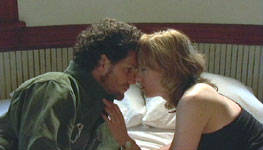 I have to tip my hat to the Moser brothers and their directing talents. I have a definite way that I want the film to look. I have a definite vision and that all gets explained beforehand. We have a lot of meetings and sometimes storyboards. So when it’s my turn to get in front of the camera, they’re really [good]. It’s all in the preparation. The more you prepare the more relaxed you can be when it’s time to act.
I have to tip my hat to the Moser brothers and their directing talents. I have a definite way that I want the film to look. I have a definite vision and that all gets explained beforehand. We have a lot of meetings and sometimes storyboards. So when it’s my turn to get in front of the camera, they’re really [good]. It’s all in the preparation. The more you prepare the more relaxed you can be when it’s time to act.
What advice would you give to an aspiring filmmaker?
Just do it. First of all, I don’t think I’m someone who really can give advice because I just think we all make our own paths and do our own things. You might be related to Spielberg, and that’s going to help you . . . . Don’t steal. Be ethical so you can sleep at night. And do get a good sleep at night so you’re not crabby at people. Otherwise, I don’t have advice other than just do it. There’s nothing stopping you.
To learn more about Dawn Westlake, visit her websites atwww.Filmbaby.com/films/2412, www.Rondecana.com, andwww.Dawnwestlake.com.
Interviewed by Kaylene Peoples
Watch the (video) interview with Dawn where she talks about her short films in detail.